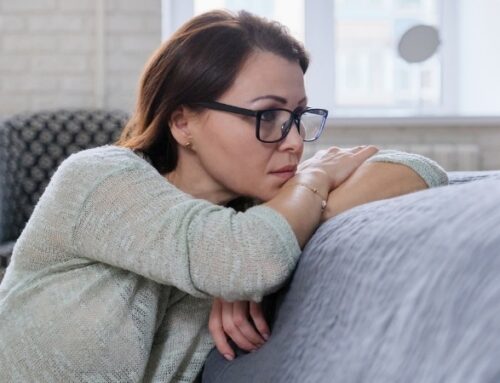Anxiety. A term that has an umbrella of meanings and finds its way into so many of our lives with different masks. What is anxiety exactly? That often depends on who you ask. For some, the term “anxiety” simply means feelings of being overwhelmed or worried. For others, it’s a word that describes their biggest struggle in life. Symptoms range from racing heart and thoughts, chest discomfort, hyperventilating to trouble sleeping and manifestation of phobias. Anxiety disorders affect 40 million adults in the United States alone, making it the number one mental illness that troubles our population.
What does living with anxiety look like for the average person suffering from an anxiety disorder? Some people suffer from what doctors call “generalized anxiety disorder”. The one symptom that is seen across the board in this diagnosis is excessive worrying. Waking up and starting to panic about an upcoming meeting, racing thoughts while driving, often avoiding situations due to fear alone. The symptoms often grow as time goes on. What was once manageable as a young teen becomes a hindrance as an adult. Often, generalized anxiety may progress into a different diagnosis such as social anxiety disorder or panic disorder.

There is Hope for Anxiety Sufferers
Social Anxiety disorder is the second most common anxiety disorder and affects over 15 million Americans nationwide. What defines this disorder is the fear of social situations, being judged or looked at in a negative way. This often causes physical symptoms such as racing heart, a flushed red face, trouble speaking or even breathing. Although it most often starts in the early teen years, a social anxiety disorder can rear its ugly head at any point during a person’s lifetime. The lack of control that comes with this often holds people back in so many aspects of life. Fear of classrooms, new jobs, new people and even something as simple as going to a doctor’s office can inhibit a person’s day-to-day life.
A third anxiety disorder that is so often not taken seriously is the presence of phobias. A phobia is an irrational or extreme fear of things. Some people find themselves set into an immediate panic over what may seem like a simple trivial item, person or place. Such phobias include things such as clowns, pomegranates, trains, spiders, birds or even certain types of music or tones. Usually, the person is fully aware that the item, person or object is harmless and yet can’t stop the terror that fills them when they are placed with it.
Quite often, someone struggling with a phobia knows how illogical their avoidance and fear is, but are still unable or unwilling to take action to overcome their struggle. In some cases, the consequences of a phobia may have no dire consequences. An example may be having a fear of snakes. For most people, the likelihood of coming in contact with a snake is minimal. However, for those persons residing in the desert or swamp-like environments, the likelihood of coming face to face with a snake is great. Only when a phobia is seen as an obstacle to one’s health, career or job prospects, or mobility (such as is the case with flying or driving) do most people feel the need to take action.
You Can Overcome Anxiety
Anxiety presents itself in many ways and affects all different ages, genders, and walks of life. From a high school student who fears to step in front of a larger group to an elderly woman who finds herself hit with panic every time she walks out the door. Suffers often feel people do not take their experience for what it is and told to just “get over it”. But at that moment, in the midst of the panic and chaos, those feelings are as real as you can get.
Suffers of anxiety are more likely to develop depression, sleep disorders, chronic headaches as well as eating disorders. It is reported that 20% of people diagnosed with some form of anxiety also struggle with alcohol or substance abuse. People often find themselves turning to self-medication which can be dangerous. These are just some of the reasons why it is important to seek professional help or encourage a friend or loved one to.
Modern medicine, as well as a rise in mental health advocacy and awareness, has led to great progress in treating anxiety disorders. Medications may effectively reduce many of the symptoms associated with anxiety, fear and panic. Psychotherapy can help sufferers gain a deeper understanding of why they struggle with anxiety and learn healthy coping skills and behaviors to enjoy a happier, more meaningful and productive life. Such practices as Yoga, Tai Chi and meditation can provide additional benefits by promoting increased focus and calm. Sometimes it’s the simple steps of self-care that can help you on your road to recovery.

You don’t have to go it alone
Depression, sadness, anxiety disorders, stress, and worry can make it difficult to find happiness in your life. We all need support at different times in our lives. Most of our clients seek help when their current way of dealing with life’s challenges no longer works for them. With a caring, non-judgmental and solution-focused approach, we will explore your issues and challenges in a safe therapeutic environment at our private practice in Delray Beach, Florida.
We also offer remote online therapy from the comfort and security of home that will allow you to learn more effective ways of managing your anxiety and stress.
Let’s walk the path to freedom from depression and anxiety together. If you’re ready to let go of the sadness, depression, fears, worries, and anxieties that are making life difficult, check out our Anxiety & Depression Support Group hosted the 1st Tuesday of each month at the Counseling Center for Growth and Recovery.





